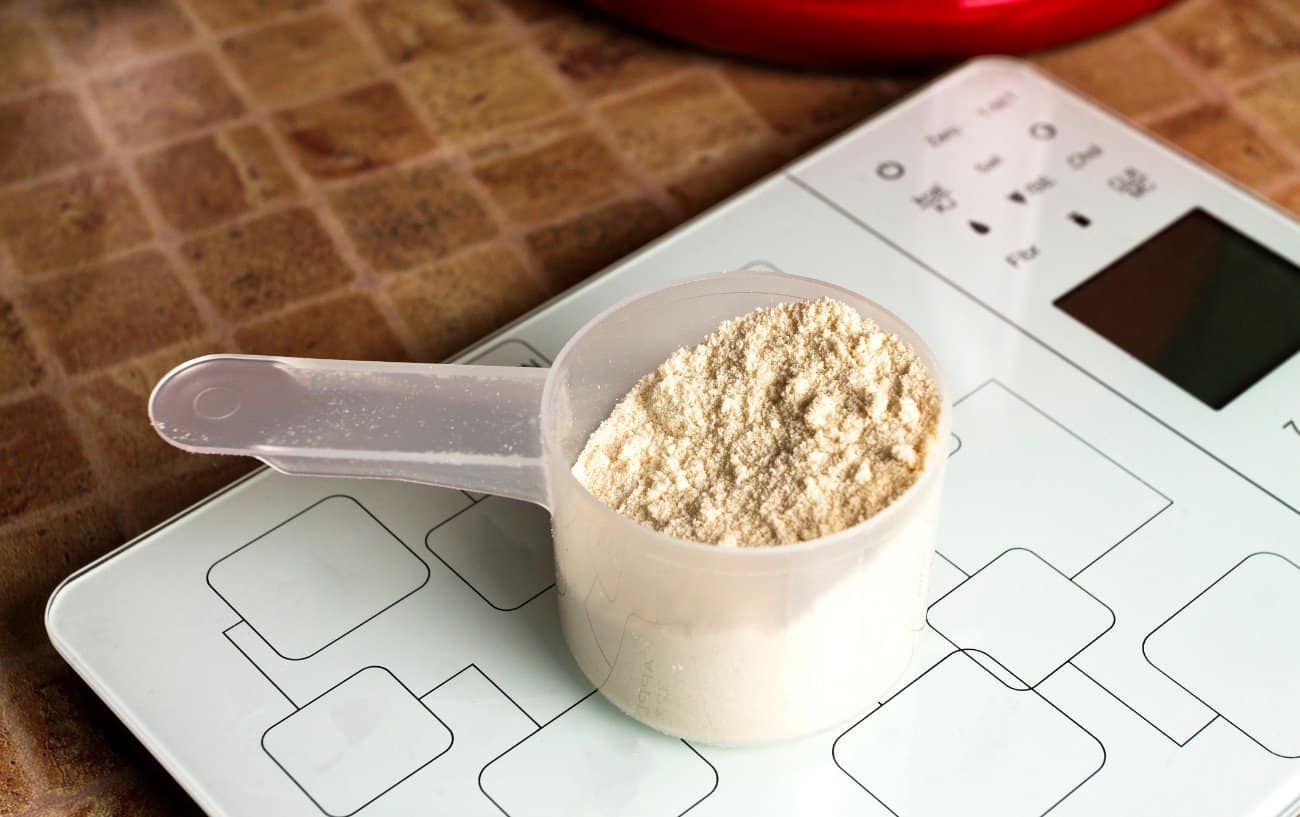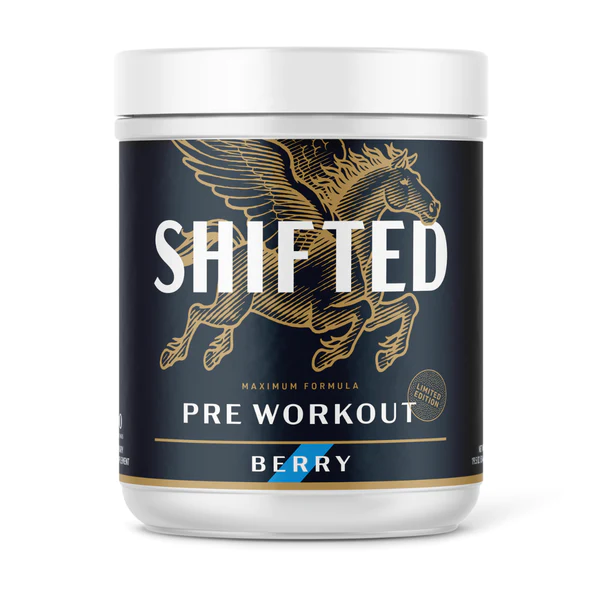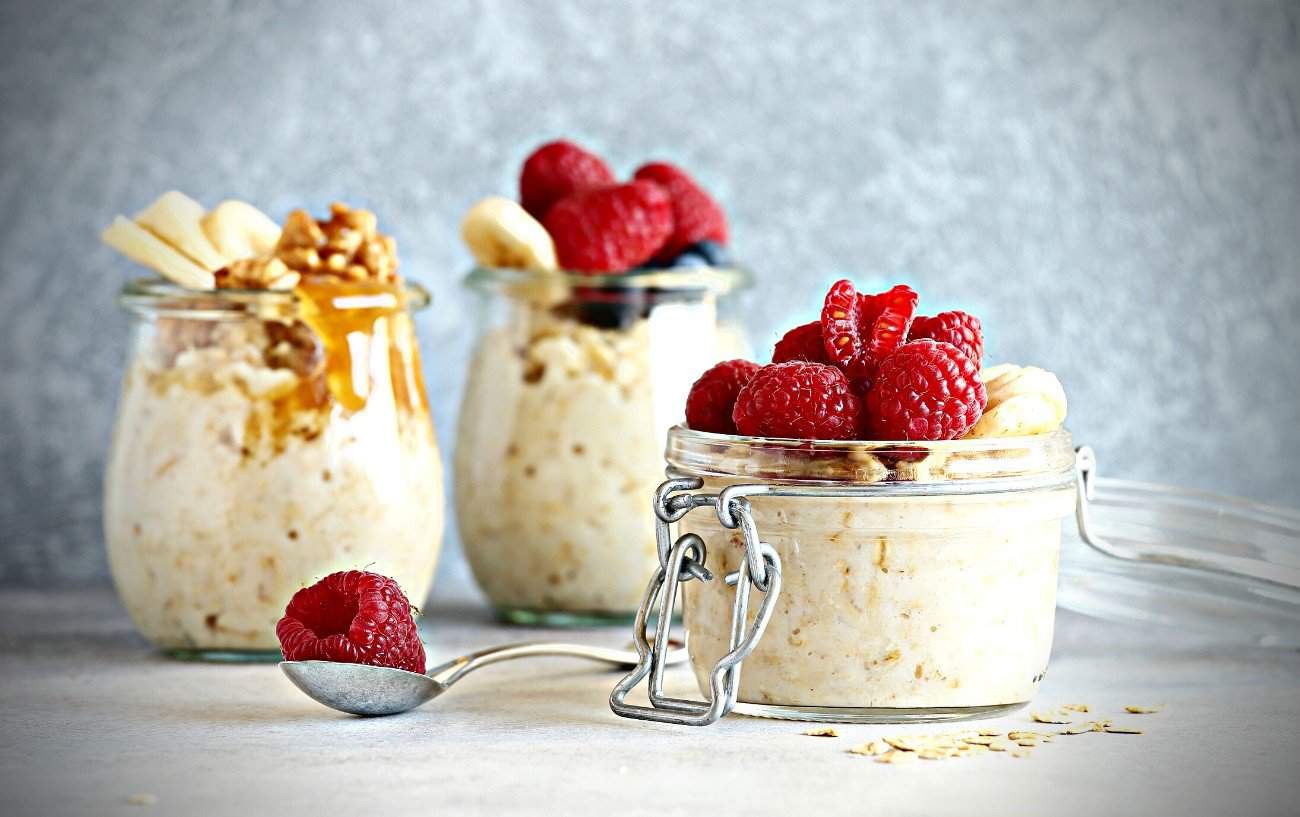Can drinking a preworkout before a training session improve your running performance?
Have you ever had a session planned for after work, but as it becomes time to clock out and head to the track, your energy levels are drained from a long day at the office?
Or maybe you planned a long run but were up all night with a sick kid or a fun night at the bar?
In such cases, your energy to run might be lacking, and you might have reason to believe you won’t bring your “A-game” to your workout.
You could postpone your run for another day, try an espresso, energy drink, sports drink, or energy chews with caffeine, or use supplements like a preworkout for running.
They’re designed to help optimize your workout, but does taking a preworkout before running actually help?
In this guide, we will explore the benefits of using a preworkout for running and help you determine whether they are useful supplements to add to your nutrition routine.

What Is a Preworkout for Running?
A preworkout for running is a type of sports supplement taken before you run or work out, designed to boost your energy and optimize performance during your workout.
Unlike a specific performance supplement like BCAAs or creatine, “preworkout” is more of an umbrella term for a category of supplements that can contain many different ingredients, vitamins, and minerals.
The specific formulation varies between preworkout supplements, as does the form of the supplement itself. For example, there are preworkout drink powders, pre-made drinks, chews, capsules, gels, among other presentations.
It typically comes as a powdered supplement drink mix that you combine with water.
Though the specific ingredients and form differ somewhat, any preworkout for running is designed to increase your energy and mental focus, prevent glycogen depletion, and boost athletic performance.

How Do Preworkouts for Running Work?
While the ingredients vary1Jagim, A., Harty, P., & Camic, C. (2019). Common Ingredient Profiles of Multi-Ingredient Pre-Workout Supplements. Nutrients, 11(2), 254. https://doi.org/10.3390/nu11020254 somewhat from product to product, a preworkout for running usually contains caffeine, beta-alanine, creatine, B vitamins, electrolytes, and/or branched-chain amino acids (BCAAs), among other less common ingredients like ginseng, various adaptogens, and Co-Enzyme Q10.
The ingredients in these pre-workout formulas are designed to provide a near-immediate boost of energy that can then be sustained throughout the workout, unlike a spike and then dip in blood sugar from simple carbohydrates.
They may also work to enhance circulation, stamina, muscle repair, mental alertness, and focus.
The following are some of the most common ingredients in a preworkout for running, along with their intended purpose:
#1: Caffeine
Caffeine is a stimulant often attested to increase alertness and energy.

Any preworkout for running will likely contain at least some caffeine, and most have between 75-300 milligrams per serving, equivalent to about one to four cups of coffee respectively.
Caffeine may also increase your stamina and/or time to exhaustion during endurance exercise.
For example, one study2An, S. M., Park, J. S., & Kim, S. H. (2014). Effect of energy drink dose on exercise capacity, heart rate recovery and heart rate variability after high-intensity exercise. Journal of Exercise Nutrition and Biochemistry, 18(1), 31–39. https://doi.org/10.5717/jenb.2014.18.1.31 found that ingesting 2.5 mg/kg of caffeine increased time to exhaustion during high-intensity exercise (11.2 minutes with caffeine versus 7.9 minutes without).
#2: Green Tea Extract
Green tea extract is not only a source of caffeine but is also thought to enhance fat oxidation during exercise.
This means that green tea might delay glycogen depletion during long runs by shifting the body towards using fat for fuel at higher intensities, somewhat sparing your limited glycogen store.

#3: Creatine Monohydrate
Creatine is a substrate in the body’s most rapid energy-generating pathway, which is used by muscles during powerful, forceful contractions.
Providing your muscles with an ample supply of readily available creatine helps ensure that ATP (cellular energy) can be rapidly generated without any delays, preventing waiting for it to be synthesized or shuttled to the muscles for usage.
#4: B Vitamins
B vitamins, especially B12, and niacin, also play a crucial role in energy production and metabolism.
This is because our bodies use B vitamins to convert carbohydrates and proteins into usable energy while also playing a key role in cell production and repair
#5: Branched-Chain Amino Acids (BCAAs)
Branched-chain amino acids (BCAAs) are three essential amino acids—leucine, isoleucine, and valine.

Their unique chemical structure enables them to bypass digestion in the liver and go straight to the muscles, where they can be immediately used3AbuMoh’d, M. F., Matalqah, L., & Al-Abdulla, Z. (2020). Effects of Oral Branched‐Chain Amino Acids (BCAAs) Intake on Muscular and Central Fatigue During an Incremental Exercise. Journal of Human Kinetics, 72(1), 69–78. https://doi.org/10.2478/hukin-2019-0099 for energy.
Another performance benefit is that BCAAs have also been shown to support4Wolfe, R. R. (2017). Branched-chain amino acids and muscle protein synthesis in humans: myth or reality? Journal of the International Society of Sports Nutrition, 14(1). https://doi.org/10.1186/s12970-017-0184-9 muscle protein synthesis, helping you repair and build muscle after a hard workout.
Finally, BCAAs may reduce fatigue during exercise. Studies show5Greer, B. K., White, J. P., Arguello, E. M., & Haymes, E. M. (2011). Branched-chain Amino Acid Supplementation Lowers Perceived Exertion But Does Not Affect Performance in Untrained Males. Journal of Strength and Conditioning Research, 25(2), 539–544. https://doi.org/10.1519/jsc.0b013e3181bf443a that they can reduce the level of perceived exertion, preserve glycogen stores6Falavigna, G., Junior, J., Rogero, M., Pires, I., Pedrosa, R., Junior, E., Castro, I., & Tirapegui, J. (2012). Effects of Diets Supplemented with Branched-Chain Amino Acids on the Performance and Fatigue Mechanisms of Rats Submitted to Prolonged Physical Exercise. Nutrients, 4(11), 1767–1780. https://doi.org/10.3390/nu4111767 during endurance exercise, and decrease lactate production,7MacLean, D. A., Graham, T. E., & Saltin, B. (1996). Stimulation of muscle ammonia production during exercise following branched-chain amino acid supplementation in humans. The Journal of Physiology, 493(3), 909–922. https://doi.org/10.1113/jphysiol.1996.sp021433 increasing the time to exhaustion.
The recommended daily intake of BCAAs for athletes over 150 pounds is 5-10 grams, whereas smaller runners are best served with a daily dosage of 3 grams.
#6: Beta-Alanine and Carnosine
Beta-alanine is another amino acid, though it’s non-essential, which means your body can produce it endogenously. That said, it can be beneficial in preworkouts because it increases the carnosine levels in your muscles.
Carnosine helps buffer the pH levels in your muscles, which is key to minimizing metabolic acidosis during a hard workout – think burning, tired legs or what people used to think was “lactic acid buildup.”

While lactic acid does not cause performance-limiting fatigue, your muscles do produce hydrogen ions (acid) during intense exercise in the absence of sufficient oxygen (i.e., when you’re breathless), and this acid accumulation hinders your speed.
Carnosine helps buffer this acid buildup, helping to keep the pH in your muscles more alkaline.
This enables you to keep pushing the pace without contending with burning, leaden legs. Some preworkouts for running contain carnosine itself, while others contain beta-alanine to stimulate the production of carnosine.
#7: L-Citrulline
The body uses this amino acid to form L-arginine, another amino acid that forms an important building block of nitric oxide. Nitric oxide dilates blood vessels, increasing blood flow to your muscles to enhance oxygenation and nutrient delivery while you run.
#8: Beetroot Powder
Beetroot powder is another common ingredient in pre workouts for runners because, like L-arginine, it increases the production of nitric oxide, which enhances blood circulation.

#9: L-Glutamine
Another amino acid frequently found in preworkouts for runners is L-glutamine.
Research8Legault, Z., Bagnall, N., & Kimmerly, D. S. (2015). The Influence of Oral L-Glutamine Supplementation on Muscle Strength Recovery and Soreness Following Unilateral Knee Extension Eccentric Exercise. International Journal of Sport Nutrition and Exercise Metabolism, 25(5), 417–426. https://doi.org/10.1123/ijsnem.2014-0209 has shown that when taken before a workout, L-glutamine may help reduce muscle soreness after exercising, as well as increase the rate of recovery by repairing microtears in the muscles.
Although L-glutamine is found in many common foods, such as eggs, chicken, nuts, seafood, tofu, and dark leafy greens, a more potent dose before a workout might enhance the post-workout recovery benefits.
#10: Electrolytes
Electrolytes like sodium, potassium, and magnesium support nerve conductions, and skeletal muscle contractions, and heart contractions. They also help maintain fluid levels in the body and can increase water absorption to enhance hydration effectiveness.
When Should Runners Take a Preworkout?
Runners who do want to try a pre-workout should take it approximately 30-60 minutes before their workout.
In case you react poorly and experience any side effects, as with trying new foods, shoes, or gear, it’s always best to try something for the first time in training, not on race day.

Downsides of Preworkouts for Running
As with most supplements, there are some potential side effects or downsides to preworkouts that runners should be aware of:
- Preworkouts can cause GI distress in runners. Some ingredients used in preworkout supplements for running, especially if they have artificial sweeteners or high levels of caffeine, can cause cramping, nausea, diarrhea, and bloating.
- Preworkouts may make you jittery: If you are sensitive to caffeine, preworkouts may make you feel jittery or anxious.
- Preworkouts may not be necessary: Sometimes, single-ingredient products are a better way to go so that you get just what you need and nothing you don’t.
What to Look for When Buying a Preworkout for Running
As preworkout supplements aren’t particularly well regulated in terms of what they can and can’t contain, it’s best to start with simple products with just a couple of ingredients.
This will be easier on your body and help you determine if the preworkout agrees with your body and works well for you.

It will also help you dial in the dosage that suits you best. If you jump in with a multi-ingredient pre-workout supplement with a bunch of different things in it, it’s hard to tease out the culprit if you react poorly.
Wherever possible, also look for FDA-regulated products, organic ingredients, clear dosing instructions, transparency in labeling and ingredients, and pre-workouts with no artificial colors, sweeteners, or chemicals.
Recommended Preworkouts for Running
Some of the best preworkout powders for runners include:
Shifted Maximum Performance Pre Workout

SHIFTED puts a ton of research into their products, and this formulation is science-backed to improve performance while being safe.
This Shifted Premium Formula Pre Workout is high-performance fuel, offering 20 to 40 servings per jar. Packed with easily absorbed nutrients, each carefully selected to help runners go further and get stronger faster.
Gnarly Pre-Workout

We just love Gnarly products! Not only does this blend taste great, but it also features 180mg of caffeine from green tea leaf and 150mg of ginseng to give you an all-natural energy boost during your runs.
Oh, and if you’re sensitive to caffeine, they’ve got you covered, with this preworkout mix also available in caffeine-free.
This is a clean product with complete transparency in the labeling to let you know what ingredients you’re getting and at what doses. It also tastes great!
Run Fit Runner’s Performance Mix

Keto friendly, low carb, low calorie and packed with vitamins, BCAAs, caffeine and more, Run Fit’s performance mix is perfect to boost the energy of those who are running to lose weight.
All in all, this is a comprehensive, multi-ingredient product with a formulation specially designed for runners – can’t go wrong!
6AM RUN Marathon Pre-Workout Powder

This preworkout for marathon runners is designed to increase endurance, so it’s ideal for distance runners.
This unique blend provides runners with a clean preworkout energy boost, improving performance and endurance. Crafted with a delicate mix of natural stimulants, it boosts you up without causing jitters.
It’s also non-GMO, gluten free, keto and paleo-friendly, and made right here in the USA.
Oh, and even better, 6AM Run offer an 100% money back guarantee if you’re not happy with the product!
Garden of Life Sport Organic Plant-Based Energy + Focus Vegan Clean Pre-Workout Powder

Built on only naturally sourced ingredients, we love that Garden of Life has managed to make an all-organic, clean and synthetis free pre workout.
Packed full of vegetable powders, exotic plant extracts, vitamins and minerals, the health benefits of the blend make this pre workout a great addition to the diet of runners and non-runners alike!

Should Runners Take a Preworkout?
In summary, supplements like a preworkout for running can only do so much.
You’ll see and feel far greater and longer-lasting benefits by optimizing your training, nutrition, hydration, sleep, and recovery than the benefits you’ll reap from any preworkout supplement.
However, if you’re already pretty dialed into taking care of the basics, a preworkout for running can potentially give you a little energy boost for those days you’re really not feeling the pep in your stride you’re hoping for.
From Preworkout Before Running To Creatine For Runners . . .
Is creatine for runners actually effective, or is it all just clever marketing?
Find all the answers here:












